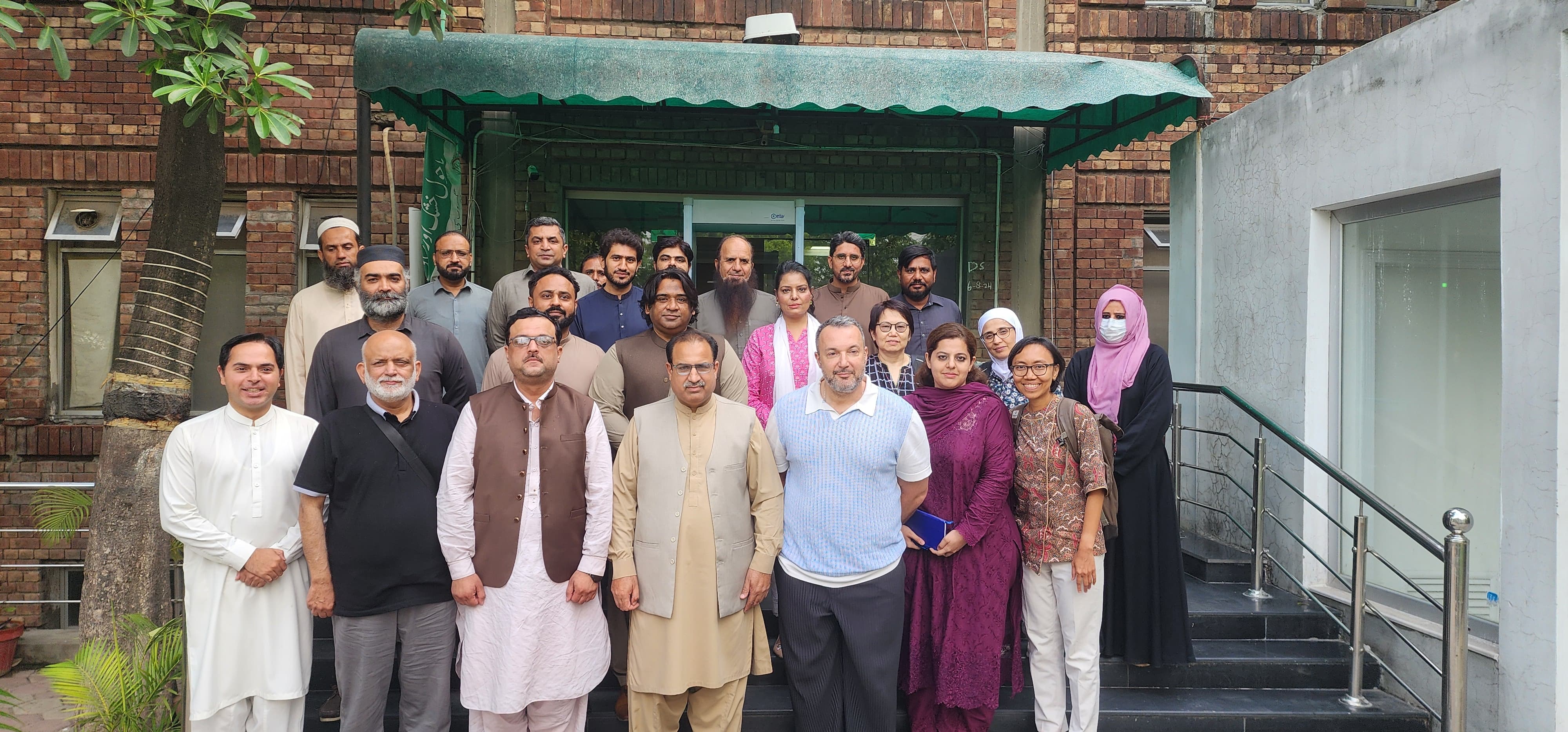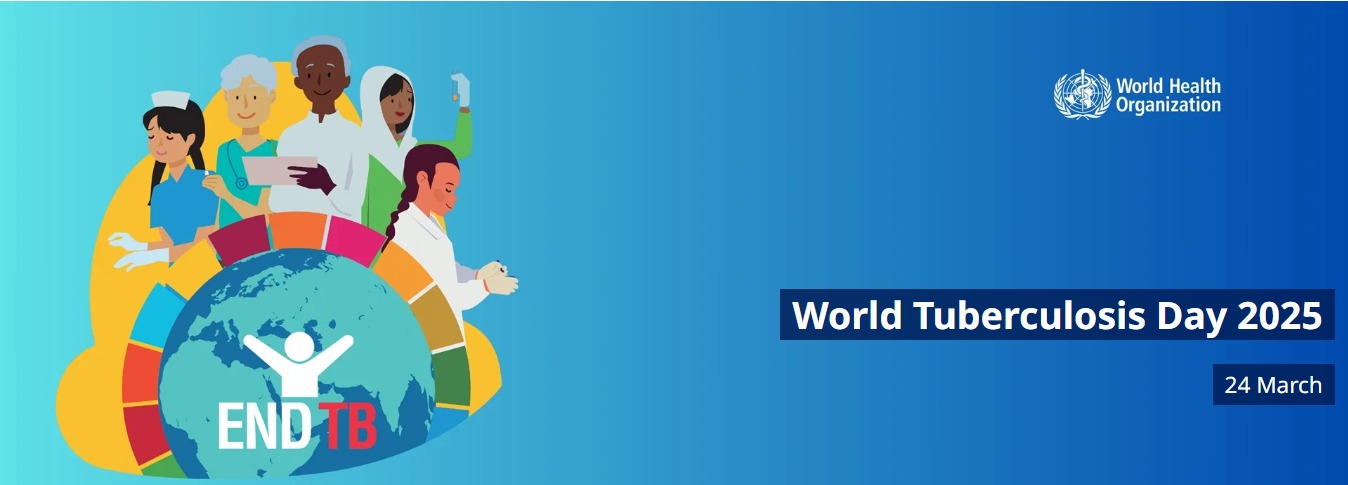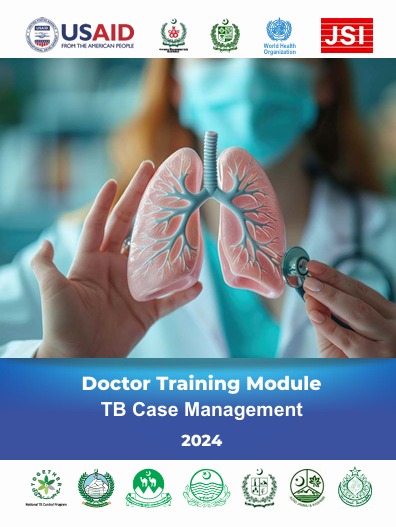NHSP Background:
The National Health Support Program (NHSP) is a comprehensive initiative aimed at strengthening Pakistan’s healthcare system, with a focus on enhancing the quality of essential health services at the primary care level. Launched in July 2022, the program is set to run until December 2026. It is cantered around three key result areas: improving the supply-side readiness of primary healthcare facilities, enhancing governance and accountability, and improving financing and public financial management. The program covers various health challenges, with a significant focus on tuberculosis (TB) control.

Revolutionizing Primary Healthcare: Integrated TB Screening Across RHCs and BHUs
DLI-4 of the NHSP specifically addresses the need to improve TB case notifications by enhancing diagnostic services, including better case detection, reporting, and referrals at primary care facilities. The NHSP aims to achieve a target of 235,000 TB cases notified annually, with a specific focus of 5000 cases through Community referrals, leveraging contributions from public, private, and community healthcare systems. To meet these goals, the program supports innovative screening interventions at RHCs and BHUs, which have traditionally underperformed in TB detection.

Revolutionizing Primary Healthcare: Integrated TB Screening Across RHCs and BHUs
Need to Establish a Technical Working Group:
To ensure the effective implementation of the integrated screening initiative and meet the ambitious targets under DLI-4, there is a strong need to establish a Technical Working Group (TWG). This group will serve as an advisory and operational body, overseeing the integration of TB diagnostics at RHCs and BHUs, facilitating interdepartmental coordination, and providing technical expertise for decision-making.
The TWG will include representatives from the Provincial TB Control Program, health department officials, technical experts, and field staff. Its main objectives will be to:
- Oversee the operational rollout of integrated screening at primary healthcare facilities.
- Monitor progress against DLI-4 TB case notification targets.
- Provide guidance on optimizing resources, including equipment, staff training, and data management.
- Recommend course corrections or improvements to ensure that the integrated screening strategy aligns with the broader goals of the NHSP.
Introduction of the Meeting:
The meeting was convened by the Provincial TB Control Program under the Primary & Secondary Healthcare Department to discuss the development and implementation of an integrated screening initiative at Rural Health Centres (RHCs). The purpose of this meeting was to review the progress of the National Health Support Program (NHSP) and explore strategies to enhance TB diagnostics at primary healthcare facilities. In particular, the meeting focused on how integrated screening at RHCs and BHUs (Basic Health Units) could improve TB case detection and contribute to achieving the targets set under DLI-4of the NHSP. Key stakeholders from the health department, program management, and field implementation teams were present to discuss operational plans, financial requirements, and immediate actions for implementation.
Minutes Of Meeting
The meeting was held to discuss the National Health Support Program (NHSP) and explore strategic planning for integrated screening across rural health centres (RHCs) and adjacent basic health units (BHUs) on 19th September 2024 at DG Health Office Lahore. The detailed agenda included the following points
Agenda :
1. Improving TB diagnostics at primary healthcare level.
2. Proposal to develop integrated screening rooms at RHCs (Rural Health Centres).
3. Financial and operational planning for the integrated screening initiative.
4. Implementation strategy for achieving DLI-4 of the National Health Support Program (NHSP).
Discussion Points:
-
Welcome & Opening Remarks
The meeting commenced with a warm welcome by Dr. Muhammad Sohail, Program Director TB control Program Punjab who thanked the attendees for their participation and commitment to the cause of public health. He highlighted the importance of integrated screening within the NHSP framework and how this would strengthen the healthcare infrastructure in Punjab, especially in addressing diseases such as tuberculosis (TB).
Key Points:
- Recognition of the importance of the NHSP.
- Introduction of the Technical Working Group (TWG).
- Expectations from the integrated screening initiative.
2. Introduction and Background:
The meeting began with an overview of the National Health Support Program (NHSP) and its goal to strengthen primary healthcare services, particularly in disease control, including TB. It was highlighted that the NHSP includes 9 Disbursement Linked Indicators (DLIs), with DLI-4 focused on improving TB case notification rates through community engagement and better healthcare service delivery.
-
Rationale for Integrated Screening:
- TB detection at primary facilities like RHCs and BHUs (Basic Health Units) is currently low. A major opportunity exists to catch missed cases.
- The target for Year 3 under DLI-4 is 235,000 TB cases notified per annum, of which 5,000 are through community case reporting, with a goal to involve community health workers like Lady Health Workers, Chest Camps, Health Weeks etc.
-
Proposed Integrated Screening at RHCs and BHUs:
- The Provincial TB Control Program plans to establish integrated screening rooms at RHCs,
which will conduct screening for TB and other diseases. - Each RHC will have a dedicated worker to manage the screening room, which will screen
walk-in patients and those referred by the chest OPD for TB diagnosis. - Data will be uploaded to the EMR system, with SMS notifications sent to patients and
facilities regarding the results.

Revolutionizing Primary Healthcare: Integrated TB Screening Across RHCs and BHUs
-
Integrated Screening Camps at BHUs:
- Weekly integrated screening camps will be conducted at nearby BHUs, with referrals from
LHWs and Medical Officers. - Samples from presumptive TB patients will be transported to RHCs for testing, and results
will be uploaded to the EMR system.
-
Financial Planning and Budgeting:
- The Provincial TB Control Program will request approximately PKR 500 million from the NHSP’s
pay-for-performance scheme to implement the integrated screening initiative. - A detailed cost sheet for the years 2024-2026 was presented, outlining costs for lab supplies, IT
equipment, transport equipment, training, and infrastructure improvements, including the
revamp of TB rooms.
-
Expected Impact and Case Detection Goals:
- It is projected that the integrated screening initiative will lead to a significant increase in
TB diagnostics, with an estimated additional detection of 56,000 TB cases by 2024. - The Program expects a 36 x increase in TB case detection at BHUs and a 0.4x increase at RHCs.
Key Decisions Made:
- The Business Plan is being approved and a funding request for PKR 500 million will be submitted to the NHSP pay-for-performance scheme.
- Revamping of TB rooms at RHCs will be prioritized, along with acquiring furniture and equipment.
- In RHCs where the revamping process has already been completed, the integrated screening intervention pilot should be implemented initially.
- In phase I, only those BHUs will be selected where 24/7 services are available.
- Start pilot intervention and see what challenges.
- NHSP Household questionnaire will be shared with all TWG Members.
- Training Module for Doctors must include HIV/AIDS related information to sensitize doctors on HIV Screening.

Revolutionizing Primary Healthcare: Integrated TB Screening Across RHCs and BHUs
-
Closing Remarks and Conclusion
The meeting concluded with closing remarks from Dr. Bilal Ahmed Khan, who thanked the participants for their valuable contributions. He reaffirmed the commitment to making the integrated screening initiative a success and reiterated the importance of collaboration among stakeholders.



0 Comments